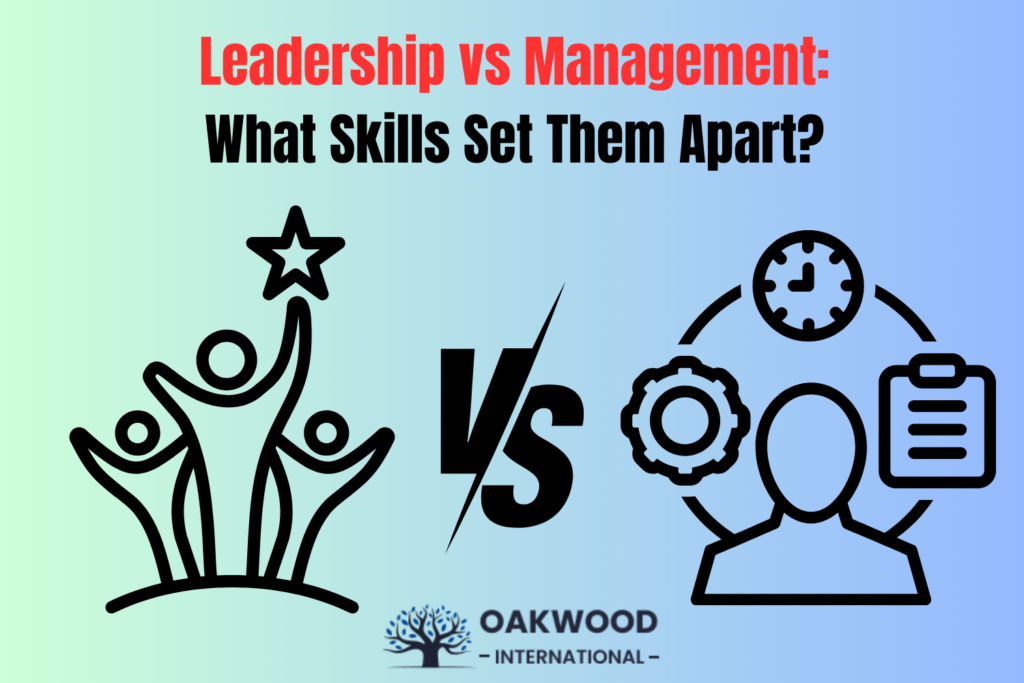Climbing the professional ladder requires more than just experience but also it demands the right combination of skills and strategic thinking. Professionals looking to grow in their careers often pursue advanced certifications to sharpen their expertise. CMI Level 5 certification is often pursued by professionals looking to advance in leadership roles. However, one common challenge they face is distinguishing Leadership vs Management—two crucial but distinct organisational functions. While both contribute to business success, they require different mindsets and skill sets.
Understanding these differences can enhance your professional growth and help you develop the right competencies for success. Let’s explore the key skills that set leaders and managers apart.
Table of Contents
- The Fundamental Difference Between Leadership and Management
- Key Skills That Define Leadership
- Essential Skills That Define Effective Management
- Leadership vs Management: Can You Master Both?
- Conclusion
The Fundamental Difference Between Leadership and Management
There has been a discussion between management and leadership, frequently resulting in misunderstandings. Despite their overlap, the two jobs have distinct functions. While management concentrates on effectively planning, organising, and carrying out tasks, leadership is about motivating, influencing, and directing people towards a vision.
A leader inspires innovation and change, guiding teams to see past their current capability. On the other hand, a manager makes sure that everything goes according to plan by putting methods in place that keep everything efficient and in order. Developing the appropriate abilities for your career begins with understanding this distinction.
Key Skills That Define Leadership
Beyond operational effectiveness, a leader needs to cultivate a variety of abilities. The following are some of the most important leadership skills:
1. Visionary Thinking
A leader sees the big picture and looks beyond immediate goals. They provide guidance and motivate their group to follow it.
2. Emotional Intelligence or EI
High emotional intelligence leaders know their and their team members’ feelings. This enables them to establish good relationships, properly handle problems, and produce a friendly workplace.
3. Strategic Decision-Making
Strategic decisions that are in line with long-term objectives are necessary for leadership. These choices frequently include taking chances, which leaders welcome to spur advancement and creativity.
4. Effective Communication
A strong leader communicates their vision and objectives. Effective communication is essential for motivating groups, settling disputes, and guaranteeing consistency with corporate goals.
5. Motivation and Influence
Leaders inspire their teams by encouraging and drive. Rather than just giving instructions, they set an example for their team, giving them self-assurance and a feeling of direction.
Essential Skills That Define Effective Management
Managers use structure and process-driven tactics to guarantee stability and efficiency, while leaders concentrate on inspiration and vision. The following are some essential management skills:
1. Planning and Organisation
Managers possess exceptional organisational abilities, ensuring team, resources, and time are distributed efficiently to meet company goals. They establish deadlines, streamline processes, and track advancement.
2. Problem-Solving and Decision-Making
Leaders focus on big ideas, while managers deal with everyday problems. To maintain the company’s smooth operation, they recognise problems, examine information, and implement workable solutions.
3. Performance Monitoring
Managers use Key Performance Indicators or KPIs and performance management strategies to monitor team performance. They guarantee accountability, evaluate progress, and offer feedback.
4. Process Optimisation
The foundation of management is efficiency. Managers use best practices and organised procedures to streamline workflows, reduce duplication, and boost output.
5. Conflict Resolution
Managers frequently referee disputes to prevent disagreements from impairing team performance, while leaders concentrate on motivating teams. Having effective dispute-resolution abilities is essential to preserving peace at work.
Leadership vs Management: Can You Master Both?
Many professionals question whether they have to choose between management and leadership. In actuality, the most prosperous people have a combination of both abilities. While a great manager knows how to motivate and inspire their team, a competent leader recognises the value of structure and organisation.
Professionals are expected to be flexible leaders who can transition between disciplined execution and visionary thinking in fast-paced business settings. What distinguishes great professionals from the rest is this equilibrium.
Conclusion
Career advancement requires an understanding of the distinction between management and leadership. Although they require different skill sets, both positions are essential to a company’s success. Consider registering in training courses provided by Oakwood International to improve your management and leadership skills.





